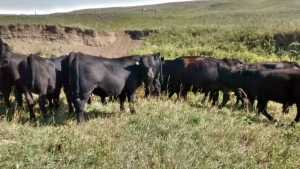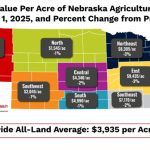New Mexico assists Clovis family dairy farm with PFAS contamination
SANTA FE — A fourth generation New Mexico dairy farmer who lost his entire herd as a result of contamination from perfluoroalkyl and polyfluoroalkyl substances (PFAS) is on the path to recovery after receiving assistance from the New Mexico Environment Department.
Highland Dairy in Clovis is a prime example of how the U.S. Department of Defense failed the communities around Cannon Air Force Base. PFAS-contaminated groundwater from Cannon Air Force Base migrated offsite and resulted in contamination of thousands of cows at Highland Dairy. Testing showed that the cows and their milk contained PFAS at levels the U.S. Food and Drug Administration deemed unsafe for human consumption. As a result, the owner of the dairy was unable to sell products from the farm and was ultimately forced to humanely euthanize 3,665 cows – the entire herd — with direction from the State Veterinarian and the New Mexico Livestock Board. The current estimated cost of this loss of revenue and increased expenses is $5,946,462, which does not account for upcoming costs associated with the on-farm composting of animal mortalities and final disposal.
“The Department of Defense poisoned Highland Dairy’s cows and the loss is devastating and heartbreaking,” said Environment Cabinet Secretary James Kenney. “Rather than take responsibility for its PFAS pollution, the Department of Defense put a family farm out of business and has the audacity to continue its litigation against New Mexico – forcing New Mexicans to pay for clean-up and legal costs. As a result, we are now assisting Highland Dairy in managing dairy cow carcasses as hazardous substances and seeking input from experts on treatment and disposal options.”
“Cannon Air Force Base knows what they have done to the groundwater,” said Highland Dairy owner Art Schaap. “They expect military personnel to have integrity, but what they are doing to the Clovis community and the farms near the base does not demonstrate integrity. They need to own the pollution.”
During routine water well testing, water containing PFAS above the acceptable standard level was detected at the well supplying water to Highland Dairy in 2018. The New Mexico Department of Agriculture obtained milk samples from the dairy and sent those samples to FDA for testing.
Simultaneously, the milk was kept off the market until test results were finalized. When the milk tested above the FDA’s screening level, all milk from that dairy was pulled off the market.
The Environment Department’s mission is to protect and restore the environment and to foster a healthy and prosperous New Mexico for present and future generations.
NMED is the state agency overseeing Highland Dairy’s plan for disposal of PFAS-contaminated livestock, which is required for the dairy to qualify for cow indemnity under U.S. Department of Agriculture’s (USDA) Dairy Indemnity Payment Program. The program, which USDA expanded late last year, provides payments to dairy producers for the lost value of their herd due to contamination from livestock exposure to chemicals, like PFAS.
In the first phase of the plan, the dairy will compost all PFAS-contaminated carcasses on the farm property in accordance with USDA conservation practice standards and provisions of the plan. In Phase 2, the Dairy will conduct PFAS analysis of the composted material and associated impacted material, such as soil at the compost site, in order to determine final removal and disposal options.
The Highland Dairy removal plan is the first of its kind nationally for addressing PFAS-contaminated cows as a hazardous waste and was developed in consultation with the USDA Farm Service Agency, the USDA Natural Resources Conservation Service, the State Veterinarian of New Mexico, the New Mexico Department of Agriculture and NMED. A copy of the Highland Dairy Removal Plan is available here.
“I support NMED’s science-based approach to ensure that livestock and other agricultural sectors are safe,” said Agriculture Cabinet Secretary Jeff Witte. “We, unfortunately, already witnessed how PFAS contamination affected a New Mexico dairy.”
Today the New Mexico Environment Department issued a Request for Information (RFI) seeking information relevant to the disposal and destruction of PFAS that will support strong policy and science- based decision-making during implementation of Phase 2 of the Removal Plan. NMED is seeking the best scientific and technical information available related to studies, technology testing, active research projects, and policy considerations from the general public, scientific/research community, private industry, academia, government agencies, and non-governmental organizations.
Topics covered in the RFI include, but are not limited to, data, reports, narratives, or other information related to PFAS-contaminated livestock, composting PFAS-contaminated livestock carcasses, PFAS destruction, incineration of PFAS-contaminated material, and data from placing PFAS-contaminated material in a hazardous waste landfill or associated research into short- and long-term risks. Responses to the RFI must be submitted through the NMED Public Comment Portal by July 18, 2022.
While New Mexico continues to lead on PFAS regulation and enforcement, the U.S. Department of Defense continues to ignore state authority resulting in increased risks to surrounding communities, drinking water, and local economies. Further, the Department of Defense has saddled New Mexicans with the cost of PFAS investigation and cleanup around Cannon and Holloman Air Force Bases.
In addition to the payment sought by Highland Dairy from USDA, NMED has allocated up to $850,000 of its hazardous waste emergency fund for expenses associated with the proper disposal of PFAS-contaminated hazardous carcasses and associated wastes. The hazardous waste emergency fund is used for clean-up of hazardous substance incidents and replenished through civil penalties collected under the New Mexico Hazardous Waste Act. Including this funding, the State of New Mexico estimates it has now spent and committed over $6M to protect the communities from PFAS – expenses that should have been incurred by the U.S. Department of Defense. A copy of NMED’s hazardous waste management fund PFAS are a group of man-made chemicals that are used for a wide range of purposes including food packaging, cleaning products, stain resistant carpet treatments, nonstick cookware and firefighting foam, among other products since the 1950s. They are found in the bodies of people and animals all over the world, and in ground and surface water, because of their widespread use.
–New Mexico Environment Department



